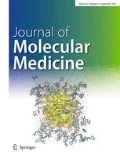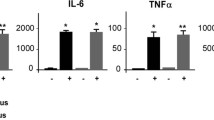Abstract
Overwhelming inflammatory immune response can result in systemic inflammation and septic shock. To prevent excessive and deleterious action of proinflammatory cytokines after they have produced their initial beneficial effects, the immune system can release several anti-inflammatory mediators, including interleukin-10, interleukin-1 receptor antagonist, and soluble tumor necrosis factor receptors, thus initiating a compensatory anti-inflammatory response syndrome. However, in vivo the delicate balance between pro- and anti-inflammatory responses is additionally controlled by the central nervous system. Therefore, proinflammatory cytokines stimulate the hypothalamic-pituitary-adrenal axis and enhance sympathetic nerve system activity. The mediators of these neuroimmune pathways can again suppress immune cell functions to control systemic inflammation. The question is, however, what happens if the immunoinhibitory CNS pathways are activated without systemic inflammation? This can result from production of cytokines in the brain following infection, injury, or ischemia or in response to various stressors (e.g., life events, depression, anxiety) or directly from brainstem irritation. The answer is that this may generate a brain-mediated immunodepression. Many animal and clinical studies have demonstrated a stress and brain cytokine mediated decrease in the cellular immune response at the lymphocyte level. More recently, the importance of monocytes in systemic immunocapacity has been shown. Monocytic inactivation with decreased capability of antigen presentation and depressed secretion of proinflammatory cytokines increases the risk of infectious complications. Interestingly, cytokines in the brain and other stressors can also generate systemic immunodepression at the monocyte level. In this scenario the catecholamine-induced release of the potent anti-inflammatory cytokine interleukin-10 is a newly discovered mechanism of the brain-mediated monocyte deactivation in addition to the "well known" immunosuppressive action of glucocorticoids. Furthermore, other neuropeptides such as α-melanocyte-stimulating hormone and β-endorphin which can be released in stressful situations have also inhibitory effects on immune cells. Thus mediators of the CNS are implicated in the regulation of immune functions and may play a role in both conditioning the host's response to endogenous or exogenous stimuli and generating a "brain-mediated" immunodepression.
Similar content being viewed by others
Author information
Authors and Affiliations
Additional information
Electronic Publication
Rights and permissions
About this article
Cite this article
Woiciechowsky, C., Schöning, B., Lanksch, W. et al. Mechanisms of brain-mediated systemic anti-inflammatory syndrome causing immunodepression. J Mol Med 77, 769–780 (1999). https://doi.org/10.1007/s001099900051
Received:
Accepted:
Published:
Issue Date:
DOI: https://doi.org/10.1007/s001099900051




